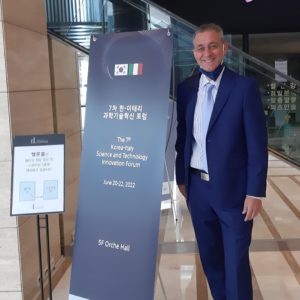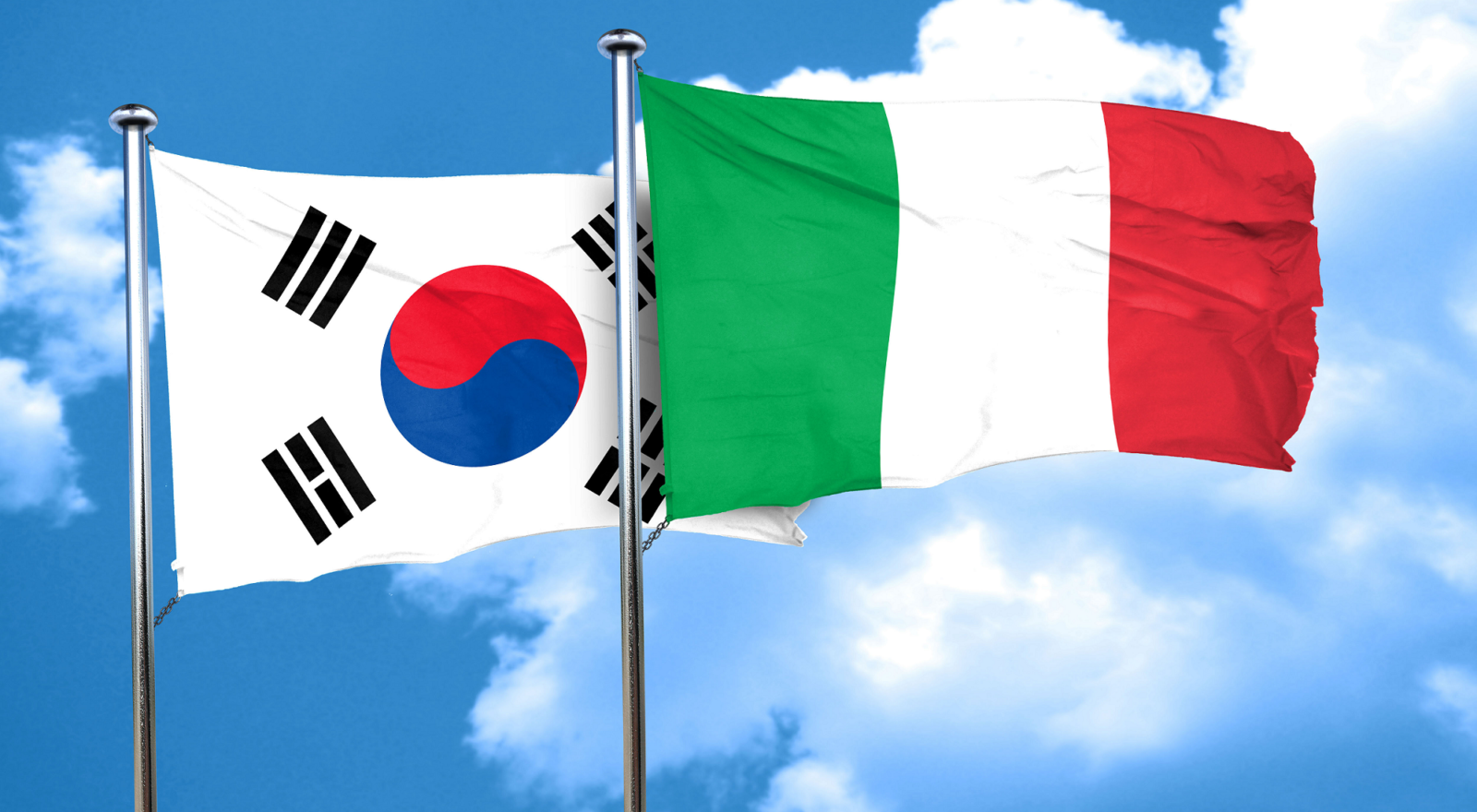FBK participates in the Italy-Korea Forum on Technology and Innovation
Two days in Seoul for an expanded meeting between Italian and South Korean science and technology players.
The seventh edition of the “Italy-Korea Forum on Science Technology and Innovation“, the main scientific-technological event between Italy and South Korea, was held June 20 through 22, 2022, at the El Tower building in Seoul, aimed at strengthening synergies and connections between research centers, institutes and universities active in innovation, and creating new ties between the two peninsulas.
The Forum was organized by the Korean National Research Foundation in collaboration with the Italian Embassy in Seoul and with the support of the Korean Ministry of Science and ICT and is part of the the Scientific and Technological Cooperation Agreement that has been in force between the two countries since 2007. It is a three-year event held alternately in Italy and South Korea. In addition to covering topics of common interest, the Forum charts the path of bilateral cooperation in the sector between our country and a partner such as South Korea, which is among the world’s top countries in terms of investment in R&D: in fact, in 2020 Korea invested 4.8 percent of its national GDP in R&D (OECD data).
The three-day event saw more than 30 Italian and Korean researchers discuss four topical issues: hydrogen and combating climate change, research and innovation applied to aerospace, microelectronics, and science and technology for cultural heritage. Present for Italy were: CNR, Institutes for Membrane Technology (ITM), Microelectronics and Microsystems, Advanced Energy Technologies and Structure of Matter, ENEA, Fondazione Bruno Kessler, Central Institute for Restoration, Polytechnic of Turin, University of Tuscia, University of Roma3 and University of Pavia. For each topic, not only the application aspects were highlighted but also the concrete opportunities for bilateral cooperation in areas that are increasingly assuming international geostrategic relevance.
The Ambassador of Italy in Seoul, Federico Failla, had the following to say on the subject, “The Forum on Science, Technology and Innovation represents the main event between Italy and the Republic of Korea this year, and not only in the innovation sector. The topics we covered, I am thinking of microelectronics and hydrogen as an alternative source of energy, are at the center of international debate and geopolitics between countries. Experts from our two countries worked together to find new solutions, but also new opportunities for cooperation. Italy and South Korea are both countries with a great innovative tradition that allows them to be at the forefront in strategic sectors. Cooperation, understood as the creation of networks and knowledge platforms, is the best way to further strengthen this primacy of ours.”
 Participating for Fondazione Bruno Kessler was Vittorio Guarnieri, Research Liaison Officer of the Special Projects Unit, who found the forum an important opportunity to discuss current issues of international interest in line with research priorities at FBK. Specifically, the opportunity to engage with Korean counterparts from the world of research and industry provided an opportunity to explore some issues, for example in the microelectronics sector, that could lead to future project developments. FBK is already involved with Korea in a European project funded through the FETOPEN instrument within the Horizon 2020 framework program, a project titled EPIQUS (Electronic-photonic integrated quantum simulator platform) in which FBK’s Sensors and Devices center is involved as project coordinator with Georg Pucker and Mher Ghulinyan. Among all the contacts made during the three-day works, we can recount some extremely interesting insights we had with ETRI (Electronics and Telecommunications Research Institute) in the area of Artificial Brain, which will bring semiconductors to work like the human brain to handle increasingly large amounts of data. Giants such as Samsung are looking to these areas of microelectronics with interest. KETI (Korea Electronics Technology Institute) has been working for years in the field of MEMS (Micro Electro Mechanical Systems), with activities close to and complementary to those developed by FBK, for example, in gas sensing.
Participating for Fondazione Bruno Kessler was Vittorio Guarnieri, Research Liaison Officer of the Special Projects Unit, who found the forum an important opportunity to discuss current issues of international interest in line with research priorities at FBK. Specifically, the opportunity to engage with Korean counterparts from the world of research and industry provided an opportunity to explore some issues, for example in the microelectronics sector, that could lead to future project developments. FBK is already involved with Korea in a European project funded through the FETOPEN instrument within the Horizon 2020 framework program, a project titled EPIQUS (Electronic-photonic integrated quantum simulator platform) in which FBK’s Sensors and Devices center is involved as project coordinator with Georg Pucker and Mher Ghulinyan. Among all the contacts made during the three-day works, we can recount some extremely interesting insights we had with ETRI (Electronics and Telecommunications Research Institute) in the area of Artificial Brain, which will bring semiconductors to work like the human brain to handle increasingly large amounts of data. Giants such as Samsung are looking to these areas of microelectronics with interest. KETI (Korea Electronics Technology Institute) has been working for years in the field of MEMS (Micro Electro Mechanical Systems), with activities close to and complementary to those developed by FBK, for example, in gas sensing.
In the field of optical and image sensors, important contacts have been made with companies such as KSP (Korea Spectral Products), and, in the field of microelectronic packaging, with “Semiconductor Packaging Technology Trends for 5G Applications” (Nepes Corporation). The opportunity to participate in bilateral international forums also leads, indirectly, to important relations with Italian colleagues from CNR and Italian universities, such as the Polytechnic University of Turin.

